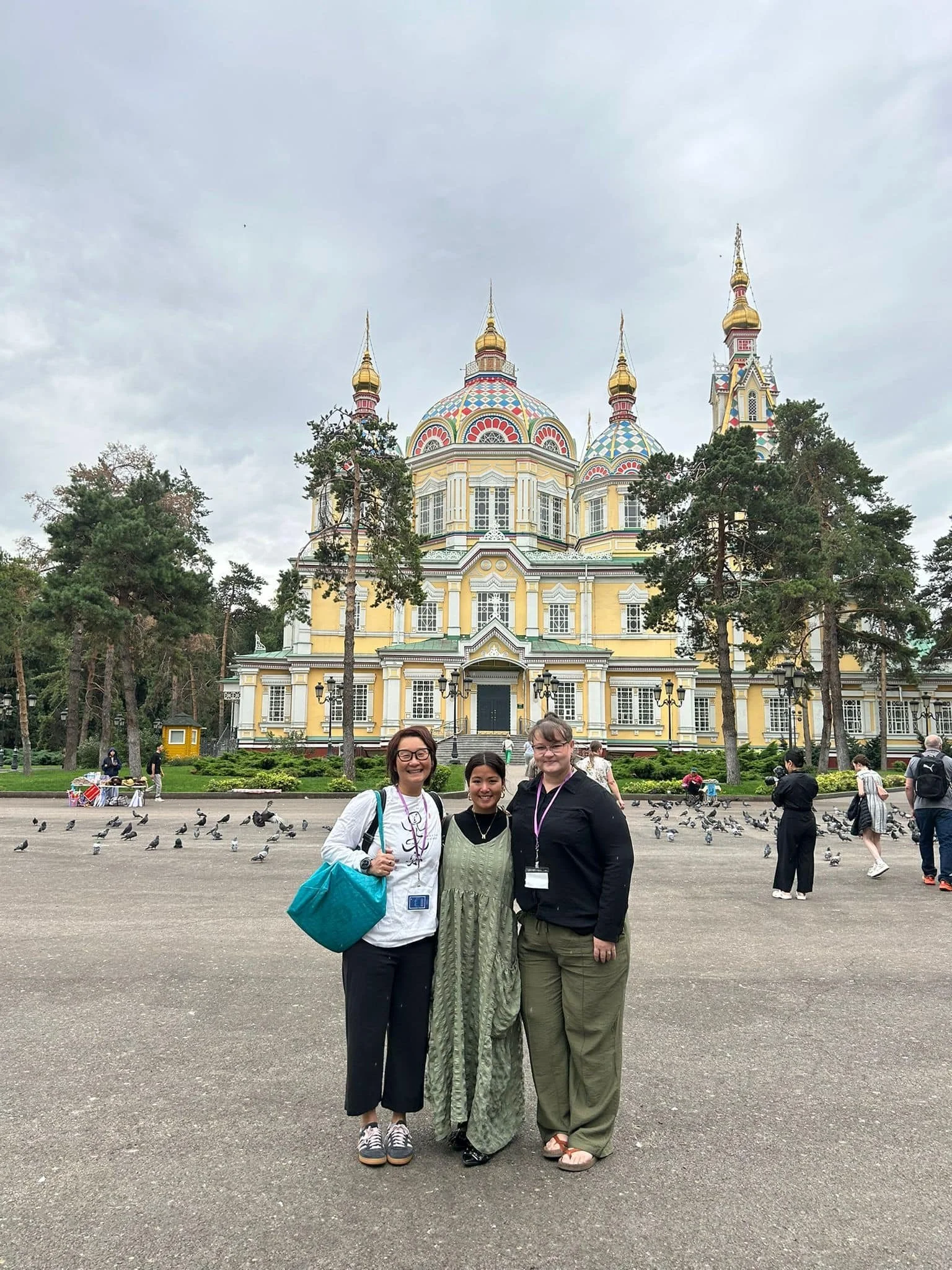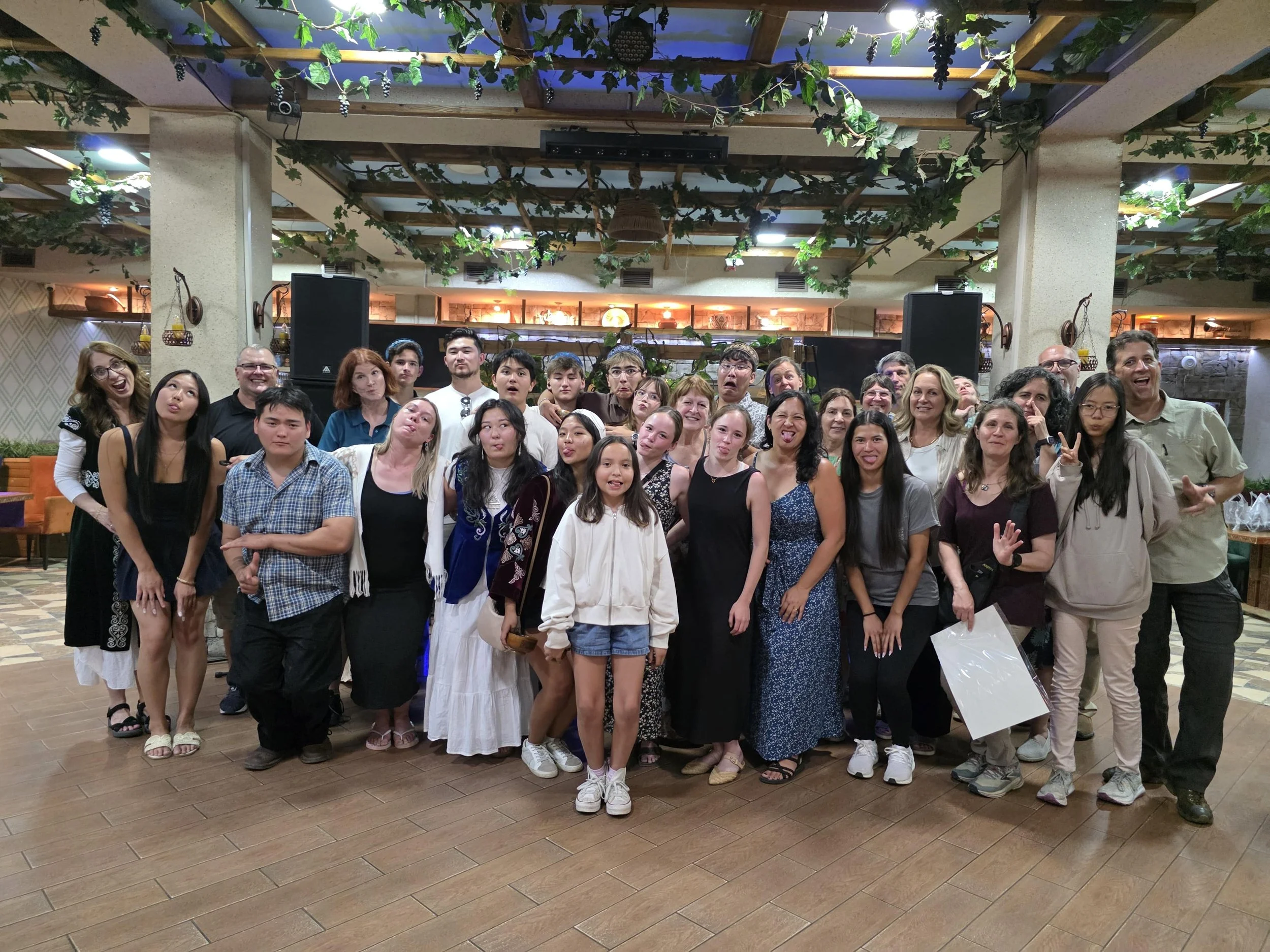Kazakhstan Ties 2025: Carrying the Torch, Continuing the Legacy
Tanya with our wonderful 2025 adjunct team members, Isabelle and Abby.
My first Ties program was in 2019, and I’ll never forget the excitement I felt when I learned that it would be in Kazakhstan. I’d never been to Central Asia, and I was eager to see how Ties created space for adoptees and their families to connect deeply with culture, history, and identity. But more than anything, I was excited to learn from Becca Piper, the visionary co-founder of The Ties Program.
Becca quickly became more than a mentor—she became a guide, a friend, and a grounding force for that trip. She had an uncanny ability to read the room, adjust on a dime, and support people through some of the most emotionally complex moments of their lives. I looked forward to connecting with her each day, soaking up her wisdom in the middle of the chaos and the rare moments of quiet. It’s those little things I remember and cherish most.
These precious, ephemeral moments of our shared humanity:
The late-night debriefs.
The way she laughed.
The calm she carried when things inevitably didn’t go as planned.
The joy she found in the work, even when it was hard.
Baursak, traditional Kazakhstan fry bread that everyone fell in love with.
The experience Becca’s team created made me feel like I was part of something so much bigger.
You don’t fully understand what a Ties trip is until you live it. It’s like stepping into a different reality—like The Matrix, where suddenly things seem to fall into place.
In 2019, we had 67 participants in Kazakhstan: adoptees, parents, siblings, and grandparents. Some came with full support systems, others leaned into the community that we built together. What we witnessed was powerful and difficult to put into words. Kazakhstan may not have the tourism mindset of other destinations–its tourism infrastructure is still emerging–but what it does have is heart and soul. The strength of the nation lies in its people: warm, resilient, and proud. Kazakhstani adoptees represent a kaleidoscope of ethnic backgrounds—Kazakh, Russian, Ukrainian, Turkic, and all possible combinations.. Their faces , their stories, questions may not all look the same, but they shared something deeply rooted: a desire to understand where they come from, how it shaped who they are, and who they will become. Watching them connect, open up, and simply say, “I’m adopted from Kazakhstan,”—without explanation—was profound and beautiful.
Abby and Isabelle with some adoptees at the top of Shymbulak, the largest ski resort in Central Asia. It started snowing when they reached the top!
When the unexpected happened, which inevitably happened often–Becca made it look effortless.. A guide once told me Kazakhstan is about 25 years behind Kyrgyzstan in tourism infrastructure. That never fazed Becca. She embodied her favorite expression: “You’re like a duck—calm on the surface, paddling like crazy underneath.” Two years in as the Executive Director and Owner of The Ties Program, I understand that now more than ever. Through it all, Becca led with grace and I aspire to do the same.
Over my past two trips, I’ve had the privilege of hearing adoptees reflect on their first time back in Kazakhstan. How things feel familiar even though they are foreign. I’ve witnessed the pride the adoptees have as they learn more about the art and music, the technology and architecture, the generosity and humor of the Kazakhstani people. I’ve seen how they connect with their fellow adoptees, oftentimes their first connection with other adoptees from Kazakhstan. How this creates understanding and connection with one another.
I’ve had the privilege of hearing adoptive parents reflect on their time in Kazakhstan—those who spent six to eight weeks in-country during the adoption process, often in newly independent post-Soviet cities. I’ve seen them walk those same streets, with their children now grown, reflecting on what’s changed and what’s remained the same, it’s deeply moving.
As someone who’s devoted my life to exploring identity and belonging, I’m endlessly humbled by the vulnerability and strength of the adoptees who I’ve traveled with across the globe. We represent diverse ethnic and racial identities, yet we are all so profoundly connected as intercountry adoptees. A place where they don’t have to explain themselves. A place where they simply belong.
The day at the Yurt is one of the highlights of the trip. Adoptees got to experience Kazakhstan traditions like horse back riding, games, dancing and eating in a yurt!
Six years later, having just returned from our Kazakhstan 2025 program, I carry Becca’s legacy with me.This past trip I had an adult adoptee tell me how amazing the trip was and how it was one of the best experiences they have ever had. They wanted to know how they could continue helping support our program and other adoptees. Another mother pulled me aside to tell me that her adoptee told her the night before that coming on this trip was the best thing the mom has ever done for her adoptee. It’s hearing intimate and powerful moments like these that fill my heart and remind me why I do this work.
Final dinner with the adoptees and their loved ones. It was a memorable way to end the 2025 trip with dancing, singing and food!
This program, this path, this possibility—it all exists because of her. Her belief in adoptees, her love for families, and her unwavering commitment to meaningful, life-changing travel continue to guide us.
I hope she’d be proud of what Kazakhstan Ties has become—and the lives it continues to touch. I know I am proud–and honored–to carry it forward in her honor .
We miss you, Becca. Thank you for the torch. Thank you for everything.
Feeling inspired?
We invite you to explore what a Ties trip might mean for you or your family. Whether you're ready to travel or simply starting to ask the big questions, there's a community here for you.
Learn more about our 2026 Kazakhstan Ties Heritage Journey. Request the info packet to explore the itinerary, pricing, and what makes this trip so special.




